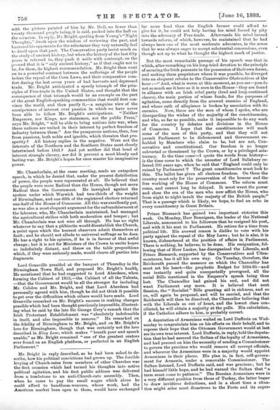Mr. Chamberlain, at the same meeting, made an outspoken speech,
in which he denied that, under the present distribution of power, the people were represented at all. He believed that the people were more Radical than the House, though not more Radical than the Government. He inveighed against the system under which Warwick had two-thirds of the weight of Birmingham, and one-fifth of the registered electors returned one-half of the House of Commons. All this was excellently put, as was also a most eloquent argument for the enfranchisement of the labourer, who, Mr. Chamberlain maintained, had managed the agricultural strikes with both moderation and temper ; but Mr. Chamberlain was not wise all through. He has no right whatever to say that a plebiscite would disestablish the Church, a point upon which the keenest observers admit themselves at fault; and he should not allude to universal suffrage as he does. He has a right to his opinion, if he is in favour of that awful change ; but it is not for Ministers of the Crown to excite hopes so indefinitely distant, and throw on the table propositions which, if they were seriously, made, would cleave all parties into fragments.


































 Previous page
Previous page